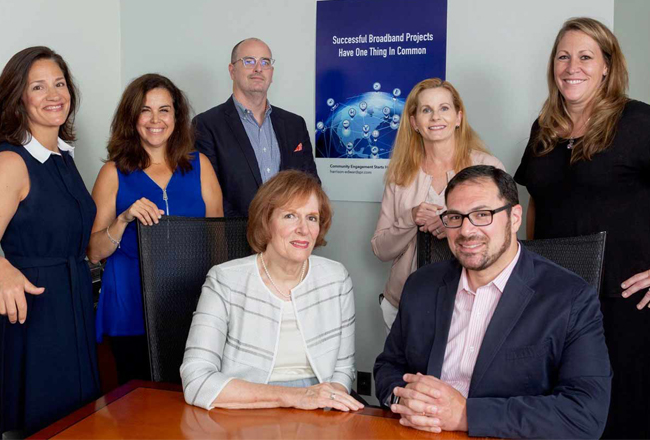
With 71,555 advertising agencies in the U.S., according to the research firm IBISWorld, it”™s noteworthy when online behemoth Facebook selects a local agency to be among only 154 agencies designated as a Facebook marketing partner.
Harrison Edwards, the public relations and marketing firm based in Armonk with offices in New York City and Memphis, Tennessee, recently found out that it has received the designation.
“It took us completely by surprise because Facebook has an application process. However, we never filed an application,” Bob Knight, executive vice president and COO of Harrison Edwards, told the Business Journal.
In the normal course of placing ads for its clients on Facebook and Facebook-owned Instagram, Harrison Edwards personnel started offering feedback and suggestions to personnel at the online platform.
“Director of Digital Marketing Jennifer Galluzzo and Vice President Lisa Buchman have continuously had a series of conversations with Facebook about ways to tweak their platform. We”™ve participated in beta tests with Facebook over the years and they had given some very specific feedback about the advertising platform to the folks at Facebook on a Thursday. On a Friday they surprised us by saying, ”˜We”™re making you a marketing partner.”™ We were thrilled by that,” Knight said.
One benefit of the partner relationship is the ability to bypass Facebook”™s automated processes when necessary and easily get to deal with real people.
“The big tech companies are notoriously difficult to reach,” Knight said. “By having this relationship with Facebook we”™re able to get live human beings because we build relationships.”
Facebook offers the partners access to additional marketing and analytic resources on both Facebook and Instagram. It decides which agencies get selected based on six criteria, including ad technology, creative platforms, small business solutions, offline conversations, measurement and community management. Partner agencies also must regularly place ads on the online platforms, which Harrison Edwards routinely does for an assortment of clients in fields such as health care, real estate and politics.
“They have a really robust targeting platform,” Galluzzo told the Business Journal. “You can target based on behavior, based on age, based on things that would help serve an ad to people who actually would like to read the ad rather than just sending it out there willy-nilly.”
Galluzzo said there are a few things about which agencies and advertisers need to be careful.
“After the Cambridge Analytica incidents they really increased the scrutiny of what you can say on Facebook because of the sensitive climate today. It affects a surprising number of ads, especially those in health care, social services, employment services and the arts. For example, one of our clients refers to allergies in their ads and you can”™t actually make an insinuation that someone (an ad recipient) has allergies on Facebook, so there”™s a real skill to be able to word the ads correctly and get the right message out there,” Galluzzo said.
She said that some clients expressed concern about retaining control of where ads are viewed once they”™re released in an electronic realm and Facebook has made improvements in the ability to control where ads are seen by enabling the blocking of ads from going up onto certain sites.
“We can block specific publishers and add brand safety filters,” Galluzzo said.
Knight said that ads, which go on Instagram would be image oriented whereas those placed on Facebook would use more text.
“If you”™re in real estate and you”™re trying to target first-time homebuyers who you typically see are between the ages of 35 and 40, a safer bet would be to work a campaign that”™s heavier on Instagram than Facebook because it”™s so visual,” he said. “People will go there and expect beautiful pictures. If you”™re a hospital or physician practice and you”™re announcing a new treatment that you have available at your facility or opening a new building or office, that”™s probably a little more perfect for Facebook because the average patient for chronic diseases tends to be a bit older. There you have an opportunity to use text and the written word more and Instagram is really about the image.”
A major benefit Knight sees in the online world is the ability to drill down in marketing.
“You target your demographic so if an advertiser is Westchester- or Fairfield-based we are not going to be serving their ad in Des Moines, Iowa,” he said. “Their ad is going to be served to people that are either living or working in Westchester or Fairfield County.”
That, of course, can also be done with careful buys in offline media and Knight emphasized that Facebook and Instagram aren”™t magic marketing bullets.
“Traditional media is far from dead,” he said. “In fact, it still remains highly effective and we don”™t believe in putting all of our clients”™ eggs in one basket, anyway. We believe in targeted marketing.”
He explained that an online campaign may also have a print component and they”™ve found that Instagram and print often work well together. “It”™s all part of a wider strategy,” Knight said.





















